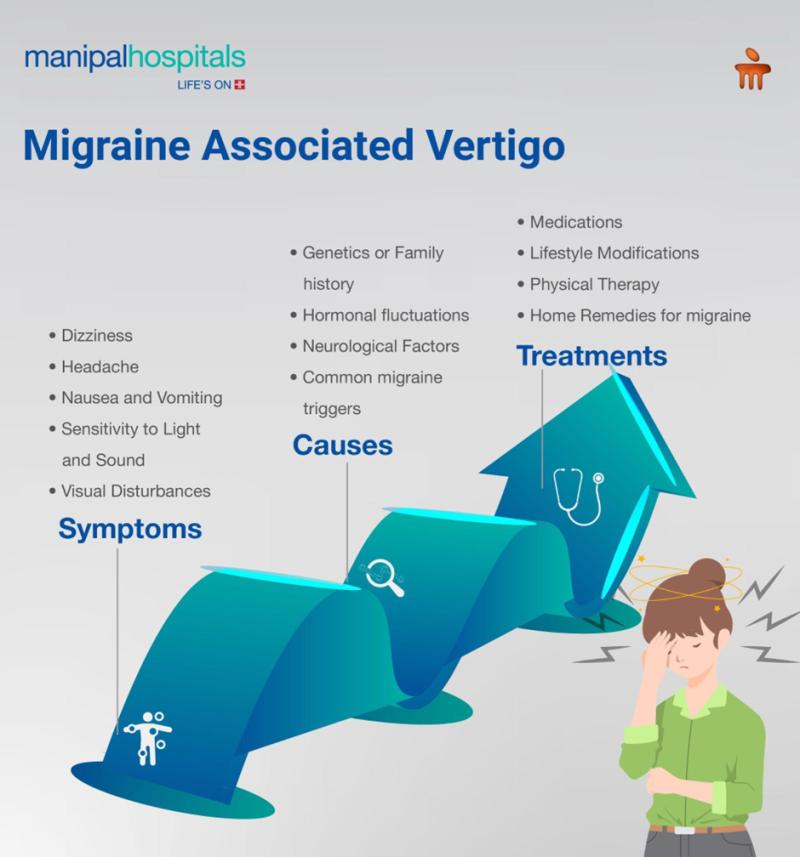Migraine-Associated Vertigo: Understanding Symptoms and Effective Treatments
Migraine is a complex neurological disorder that affects millions of people globally accompanied by a range of debilitating symptoms including Migraine Associated Vertigo or MAV and is a common ailment among individuals of all ages. The conditions pose unique challenges in the care and well-being of all age groups, concerning elderly people. Therefore, it’s important to understand the causes, types, signs and symptoms of the condition to evaluate the effective treatments. But before that, we must know what is Migraine-Associated Vertigo with a focus on how it relates to elder care and assisted living.
What is Migraine-Associated Vertigo (MAV)
Migraine-associated vertigo, also known as Vestibular Migraine, is a neurological disorder characterized by a combination of migraine symptoms and vestibular disturbances. Vestibular disturbances include dizziness, vertigo, and imbalance. In essence, it's a condition where migraines and balance problems converge, often making daily activities a daunting challenge for the elderly.
Types of Migraine-Associated Vertigo
Migraine-associated vertigo can be categorized into two main types:
- Vestibular Migraine (VM): This type primarily presents with vertigo and imbalance as the predominant symptoms. You might also experience a headache along with it. Elderly individuals with VM often experience sudden and severe episodes of dizziness, leading to falls and an increased risk of injury.
- Migraine-Related Dizziness (MRD): Unlike VM, MRD primarily involves non-vertiginous dizziness or a floating sensation. The elderly with MRD may not experience classic migraines with severe headaches, making diagnosis and management more challenging.
Causes of Migraine Headaches
Understanding the underlying migraine headache causes is essential for effective management. Several factors contribute to the development of MAV, including:
- Genetics:A family history of migraines can increase the risk of MAV in elderly individuals.
- Hormonal Changes:Hormonal fluctuations, especially in women during menopause, can trigger MAV.
- Neurological Factors:Abnormalities in the brain's vestibular system, responsible for balance and spatial orientation, play a crucial role.
- Triggers:Common migraine triggers, such as certain foods, stress, lack of sleep, or weather changes, can also precipitate MAV in seniors.
Symptoms of Migraine-Associated Vertigo
Recognizing the symptoms of Migraine-Associated Vertigo is vital for early intervention. Elderly individuals experiencing MAV may exhibit the following:
- Dizziness: Persistent or episodic dizziness and vertigo are hallmark symptoms. Elders may complain of a spinning sensation or feeling off-balance.
- Headache: Although not always present, migraine headaches in MAV can be severe, throbbing, and localized to one side of the head.
- Nausea and Vomiting: These symptoms may accompany both migraines and vertigo episodes, leading to significant discomfort.
- Sensitivity to Light and Sound: Photophobia (sensitivity to light) and photophobia (sensitivity to sound) can exacerbate migraine-associated discomfort.
- Visual Disturbances: Elderly individuals with MAV may experience visual disturbances like blurry vision, visual aura, or flashing lights.
Available Treatment Options for Migraine-Associated Vertigo
The treatment of MAV involves a multifaceted approach to manage both the migraines and the associated vertigo. Here are some treatment options commonly used to alleviate symptoms:
- Medications:
Several medications can be prescribed to manage migraine headaches and associated vertigo. These may include pain relievers, preventive medications and drugs specifically designed to address vertigo.
- Lifestyle Modifications:
It is essential to identify and avoid migraine triggers maintaining a consistent daily routine, dietary changes, stress management techniques and improving a regular sleeping schedule. These changes in day-to-day life would help to manage the chronic migraine and associated vertigo.
- Physical Therapy:
Vestibular rehabilitation therapy (VRT) can be immensely beneficial for seniors with MAV. Trained physical therapists can help improve balance and reduce dizziness.
- Home Remedies for migraine:
Some effective home remedies for migraine headaches can be helpful in case of mild symptoms. The following exercises can be practised to relieve headaches, such as resting in a dark, quiet room, applying cold compresses to the forehead, and staying hydrated.

Migraine Treatment in India for the Elderly
In India, where elderly care is a growing concern, addressing MAV and migraines in seniors is of paramount importance. Access to healthcare and specialized treatment centres for elderly individuals with MAV is essential. India has made significant strides in this direction with the establishment of geriatric clinics and centres of excellence.
Some of the key aspects of chronic migraine treatment in India for the elderly include:
- Specialized Neurologists: India boasts a cadre of experienced neurologists specializing in migraine and vestibular disorders, ensuring precise diagnosis and treatment.
- Traditional Medicine: Ayurveda, one of India's traditional systems of medicine, offers alternative therapies and herbal remedies that can complement Western medicine in managing migraines.
- Geriatric Care Facilities: India's geriatric care facilities and assisted living communities are increasingly equipped to cater to the unique needs of seniors dealing with MAV and migraines.
Conclusion
Migraine-associated vertigo can significantly impact the lives of elderly individuals, making it essential to understand its causes, symptoms, and chronic migraine treatment options. In the context of elder care and senior services, addressing Migraine-Associated Vertigo becomes even more critical, as it can lead to falls, injuries, rapid weight loss and a reduced quality of life. With proper medical attention, lifestyle modifications, and support from healthcare providers, elderly individuals can manage MAV and migraines effectively, allowing them to enjoy their golden years with enhanced comfort and well-being.
More to Read:
Previous Posts:











